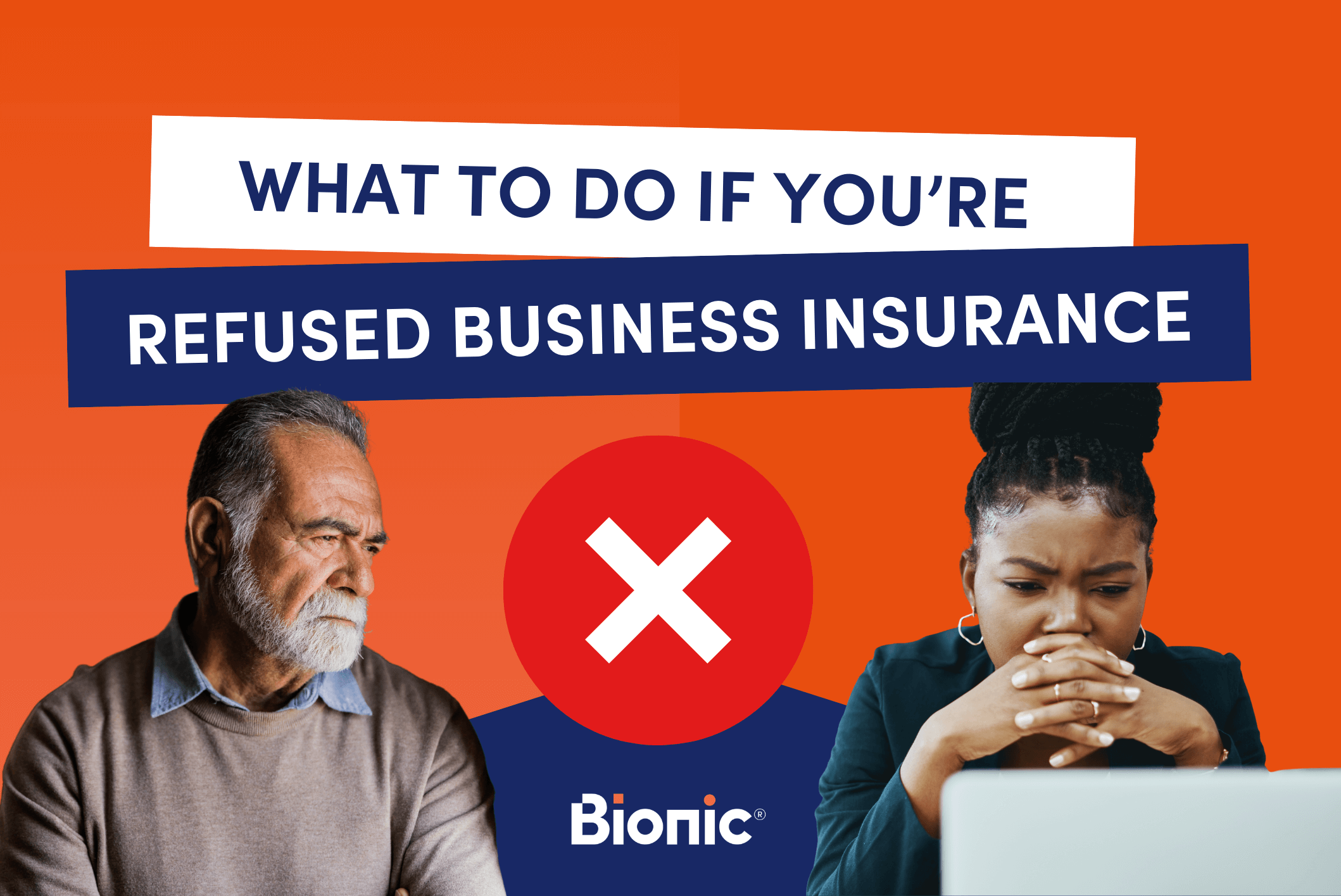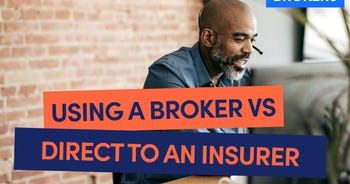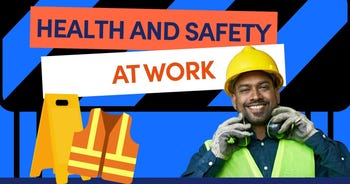What happens if you're refused business insurance?
44% of UK SMEs are operating without insurance — that’s a lot of businesses putting themselves at risk. But what happens if you’ve tried to get insurance and you’ve been refused a quote? No one wants that hassle.
In this guide, we talk through why you could be refused insurance and give detailed steps on what you should try next to sort out cover.

Why was my business insurance refused?
Insurers can look at multiple risk factors when deciding whether to insure you. From previously rejected claims to the insurer simply not specialising in your industry – there can be many reasons why it could happen. Some more complex or high-risk businesses may need to be looked at by a specialist broker to get insured. It can also vary by industry.
Many previous claims
If you’ve had a previous claim rejected and your policy voided, or your insurer has refused to offer you a renewal quote, then your new insurer might also reject your cover request.
Similarly, if you have a history of claims made for or against you, you could be considered high risk and not all insurers may be willing to take you on. Insurers' appetite for risks are different, this could be down to your trade, business activities or location or any number of factors.
Financial instability
If you have a poor credit rating, any recent bankruptcies, or County Court Judgements (CCJs), this could make insurers wary as it could indicate you may have issues paying your premium.
For example, when a company loses clients that account for 50% of its revenue, it could become financially unstable. Insurers might not be willing to take on a company with that much risk involved.
Uninsurable risks
An uninsurable risk is what the name suggests — it’s a condition where the risk is considered too large or unlawful for most insurers to cover. In theory, there isn’t anything that cannot be insured – but it’s about finding the right broker that is willing to cover the risk.
Insurers don’t take risks like this lightly, and they are not always simple decisions to make.
What one insurer deems as too risky, another insurer might be okay with in certain conditions, so there isn’t a one-size-fits-all list.
High risk
Some businesses are naturally high risk — like a fireworks factory or construction workers who work with dangerous machinery. For these businesses, certain “high risk” policies can sometimes be taken as an add-on.
In some cases, your business may be considered too high-risk for some insurers. For example, working in a factory with unregulated chemicals could cause your insurance cover to be refused when looking to get a quote.
Lack of information or proper documentation
For insurance providers to underwrite your business, they need lots of information about your business. This can include details of trading, annual turnover, employees and claims history. If any of this information is incorrect or not provided, your cover could be delayed or refused.
It’s best to gather all your documents before you go ahead and get a new quote. Brokers are likely to ask you to provide these documents so they can pass them on to your chosen provider.
Not complying with safety regulations
If your business is involved in a claim due to not following safety regulations such as The Health and Safety at Work Act 1974 and Food Safety Act 1990, your existing policy could be invalidated.
Even worse, you could be refused cover in the future, and those that do offer insurance might charge a higher premium.
Fraudulent activity or misrepresentation
If you have a record of fraudulent activity or your business has been investigated for insurance fraud, then it’s likely to hurt your chances of being accepted.
Even innocent misrepresentation can cause issues. This is where you accidentally enter the wrong information about your business when applying for insurance. For example, guessing you have a concrete roof, when actually it’s made from timber, could mean your policy is void when you come to claim.
Lack of knowledge
If your insurer doesn’t specialise in your business niche, they could refuse your insurance cover. But that doesn’t mean you can’t get insured, sometimes it’s just not the right fit. If this happens, it’s best to get in touch with someone who can help you find the right insurer — like a broker or the business insurance team at Bionic.
Unsuitable roofing
If your building has an unsuitable roof – like one made with felt and timber, some insurers may decide not to insure you. Without a sturdy, concrete roof, you may be deemed more susceptible to damages from storms and bad weather.
Industry specific reasons
- Construction or trades using hazardous materials may be deemed riskier by insurers
- Takeaways, cafes and other food businesses without a Food Standard Agency rating of 3 or above (or pass in Scotland) may not be able to get a quote from some insurers. However, this doesn’t mean you can’t get a quote entirely, but your choice of insurer may be limited.
Your history as the company director
As the company director, your personal financial history could directly affect your eligibility when it comes to getting insured. Bankruptcy, individual voluntary arrangements (IVAs), or being in debt could result in being unable to get a quote from insurers, even when the business's finances appear pretty stable.
If you have any criminal convictions, especially involving fraud or dishonesty, this could make it even more complicated. But, there may be some specialist insurers that work with businesses facing these challenges, so it may not mean you're completely uninsurable.
At Bionic, if you have any criminal convictions, CCJs or bankruptcies, we may still be able to help find a solution for you.
What should you do if you can’t get an insurance quote?
If you’ve tried to sort your business insurance but you can't get a quote or cover due to your trade, sums insured, or it’s deemed too risky. Here’s what you should do next:
Request a detailed explanation
Knowing the reasons why your insurance quote was denied will help when it comes to reapplying elsewhere. In some cases, the broker and insurer may feel they just can’t offer you proper cover.
Tara Mitchell – Insurance Technical Manager states - “It can be distressing if you can’t get an insurance quote, especially if you’re operating without cover while you sort it out. Know you are within your right to ask your insurance provider for an explanation of why your insurance was denied when you tried to get a quote. You can request a written answer, and your insurer should send one. This can help you put any issues right, or find an alternative provider”
Consider alternative insurance providers
If you’re not having much luck, it might be time to explore other options. Some insurers may approach risk assessment differently, or you could even find an insurance provider through a broker that specialises in your business area.
At Bionic, we can help to insure businesses of all sizes in trades, retail, manufacturing, hospitality and much more. Get in touch with our insurance team today by starting a quote in the right-hand bar to get started.
Will getting rejected affect future attempts to get insurance?
This depends on your situation and the reasons why you couldn’t get a quote in the first place.
But one thing is for sure, when going through the process of getting a quote with a broker, you have to answer questions truthfully and to the best of your knowledge.
If you can’t get a quote, sometimes it’s down to sums insured, trade or risk but if they ask about any previously denied claims, you need to give them an honest answer. Ultimately, it’s then up to the insurer whether they decide to offer you cover, and it’s in their right to refuse.
If I can’t get a quote, will this affect my ability to operate legally?
This depends. Two types of business insurance are legally required in some circumstances:
- Employers’ liability insurance - if you have one or more employees. If you can’t get this insurance, you won’t be able to operate legally.
- Business motor insurance - Your motor insurer will need to be informed if you use your vehicle for business purposes. If you have a van for business, it is a legal requirement to purchase motor insurance.
At Bionic, unfortunately, we can’t cover you for business motor insurance.
Imagine you own a takeaway that delivers using vehicles, then you may need a policy that includes occasional business use, if using employee vehicles to deliver or collect. If you’re unable to get a quote for business motor insurance. Then, in this case, you won’t be able to operate legally, and if you still go ahead, you won’t be covered for accidents, or liabilities which could put you at risk of hefty legal costs and damages. Not to mention, you might get yourself and your business in trouble with the law.
But, you can get takeaway insurance for your premises and the vehicles you operate separately from different insurers. If one insurer can’t help you cover both the vehicles you have and your business premises, then it is possible to secure these covers with different providers to give you the legal protection and peace of mind you need.
How can I find alternative insurance providers?
It’s not always the end of the world if you can't get a quote in the first place. There are other options, like speaking to a broker to explore alternative insurers.
Speak to a broker first
Experienced insurance brokers offer advantages over going direct to insurers. They normally have access to a broad selection of insurers for different business types. They can present options available to you, saving you time and hassle.
They could potentially speak to insurers about your specific situation, explain the circumstances that led to previous quote refusals, and come back with your options.
Specialist high-risk insurers
Some brokers work with insurers who specialise in difficult-to-place risks or specific high-risk sectors – like construction. These providers understand risky industries and can often offer cover that general business insurers won't consider.
They tend to also look at risks differently and may offer cover with modified terms instead of refusing completely.
Niche insurance providers
You may need to go down the specific industry route, where you opt for an insurer that has specific experience in your niche. These providers may understand your business type better than national companies and could offer more flexible options for cover.
If I can't get a quote, will this affect applying for insurance in the future?
It’s possible that when you’ve been refused cover in the past, it could affect future quotability. But it doesn’t always mean you are uninsurable if handled correctly.
What if I’ve had claims denied in the past?
If you’ve had previous claims refused, it could be for non-compliance with a condition, and may therefore result in additional terms, conditions or exclusions being applied to the policy. But you may be able to demonstrate an improvement to your risk profile with relevant risk management in place.
For example, you take steps to reduce the risks that caused the refusal in the first place like better health and safety procedures or property maintenance.
How can I prevent my insurance from being refused in the future?
If you take steps to reduce risks within your business, then you may find things are more straightforward when it comes to arranging your next business insurance policy.
Risk management best practices
- Make sure you have professionally written health and safety policies relevant to your specific business activities. Always carry out regular risk assessments, keep staff trained and report any accidents or injuries using the RIDDOR framework. Clearly document that you take risk reducing measures seriously.
- When it comes to your building, make sure you have proper security measures in place, including burglar alarms, CCTV systems, and secure storage for valuable equipment or stock.
Make sure your business is financially stable
- It’s really important to keep your books in order, especially if you’ve had financial issues in the past. Always pay suppliers on time and keep some cash reserves. It’s good to know that some insurers may work with your credit score and, therefore, good credit ratings can potentially improve your attractiveness to insurers.
- If you’re books aren’t accurate and you need to improve them, consider working with a qualified accountant to improve financial reporting and demonstrate business stability.
Comply with safety regulations
As mentioned earlier – proper health and safety is really important to follow, especially if you are in the hospitality business – like a pub or restaurant.
- Read up on health and safety requirements specific to your business niche. Not following procedures could create extra risks that insurers want to avoid.
- As well as procedures, make sure you have the right business licences to run your business or have memberships to professional bodies relevant to your industry – like those for accountants. Having these in place demonstrates you hold professional standards and show a commitment to following best practices.
Document and keep detailed records
- Keep detailed records of all business operations, safety measures, and improvements you’ve made to reduce risks. This documentation supports future applications and demonstrates professional management.
- Include staff training records, equipment maintenance schedules, and any professional advice you've taken on board. Well-documented businesses can appear more professional, and it may even help lower you’re premium.
Specific guidance for high-risk businesses
Whether you run a kebab shop or a bridal shop - different industries face unique challenges when looking for insurance after being refused a quote, so looking at specific guidance can be helpful.
Construction and trades
Construction businesses naturally run into lots of risks, due to the increased risk of accidents from working at heights and with dangerous machinery. If this is you – listen up.
- Always take health and safety management seriously by carrying out regular risk assessments, training staff to high standards and ensuring you have the right PPE – Personal Protective Equipment like safety footwear, helmets and gloves.
- Have emergency response plans in place in case the worst happens, with clear evacuation routes – this can go a long way in showing insurers you are reducing the risk of injury.
Hospitality and food business cover
- Conduct regular risk assessments to make sure you and your staff know all the risks that could happen. This includes things like trips, spills and fires
- It goes without saying that you should ensure proper food safety and maintain excellent hygiene ratings to keep customers safe
- Document your staff training programmes, make sure you label allergens, and keep your equipment maintained.
Professional services protection
Businesses that fall under professional services often need professional indemnity insurance – if this is you, read on.
- Make sure you keep detailed client records, especially contractual terms.
- Keep any professional development records and proof of professional body memberships. This can show insurers that you operate your business professionally and are taking steps to reduce liability risks.
- If you can’t get indemnity cover with your broker and you need it to practice, then look into specialist professional risks insurers who may be able to help further
Can I make a complaint if I’ve been refused an insurance quote?
Even if you think you should complain, it might be a better idea to try a different broker to try to find insurance elsewhere.
Speak to another broker
Often, brokers have a select panel of insurers they work with, so a different broker may have a different panel to choose from.
If you have tried getting a quote with us at Bionic, you can find another broker through BIBA (British Insurer’s Brokers Association.)
What do I need to consider if I can't get a quote and I operate internationally?
If you’ve been refused commercial insurance and you operate overseas, then this can be even more complicated to find cover. Here’s what you can do:
Find cross-border business coverage
- Not all standard UK brokers offer cross-border coverage – this is insurance cover if you run your business overseas, even partly.
- This type of cover is often offered by specialist insurers that operate in international markets. They often understand different legalities and risks associated in different countries.
- So, if you find your business has been refused cover, and you operate overseas – then you might not be at fault. Instead, the insurer you are using may not be right for your business needs.
At Bionic, we can help insure you if you are a UK based company and export or important goods, but we cannot insure global operations that are not UK based. Get it touch with us today for more support.
Look into export credit insurance
If you’re a small business exporting goods or services overseas you may need export credit insurance to protect against customers or suppliers not paying you. This is a specialist cover and requires experienced insurers who are familiar with international trade risks. There is also a UK credit risk.
Again, not all brokers will offer this type of insurance so you might not be able to get a quote, simply because they can’t offer it.
At Bionic, unfortunately, we are unable to offer export credit insurance for your business.
How Bionic can help
If you can’t get an insurance quote and you don’t know why – don't fret – it may not even be your fault. The first thing to do is to find out why, and then look for alternative solutions. Sometimes this may mean trying another broker who is more suitable, or tightening up the way you run your business to demonstrate better risk management.
If you need help sorting out a new insurance provider. Get in touch with the team at Bionic who can help sort your business essentials, including business insurance, business energy and phone and broadband, including VoIP.








